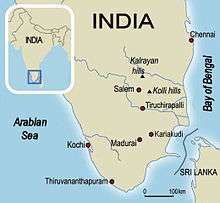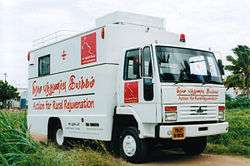AYUSH-ISHA Organic Health Systems
| AYUSH-ISHA Organic Health Systems | |
|---|---|
| Mission statement | One Life Touching Another |
| Commercial? | No |
| Type of project | Health project |
| Location | Kolli Hills, Tamil Nadu, India |
| Established | 9 October 2010 |
| Funding | Government of India |
| Website | www.ishaoutreach.org/ayush/ |
AYUSH-ISHA Organic Health Systems is a pilot health project currently being implemented in the Kolli Hills, in the district of Namakkal, Tamil Nadu. The projected is being conducted as a collaborative effort between Action for Rural Rejuvenation – the social outreach initiative of the NGO, Isha Foundation, and the Department of Ayurveda, Yoga and Naturopathy, Unani, Siddha and Homoeopathy (AYUSH), Ministry of Health and Family Welfare, Government of India. The primary goal of the project is to assess the feasibility of introducing India's traditional systems of healthcare, such as Siddha, Ayurveda, and yoga, into the mainstream public healthcare system.
Inception
AYUSH-ISHA Organic Health Systems was launched on 9 October 2010, at Namakkal district, Tamil Nadu.[1] The project implemented by Isha Foundation, was financed by a Government of India fund of ₹2.5 crore (US$370,000) to ₹3 crore (US$450,000).[2][3] The project also instituted a volunteer corps who would ensure the sustainability and day-to-day operation of the project. The project was to run for a duration of one year with the possibility of running for a further two years based on the success and outcome of the pilot initiatives.[3]
Kolli Hills

Kolli Hills is located in the Eastern Ghats mountain range of the Indian peninsula. Situated on a plateau, Kolli Hills is covered in dense forest and is inhabited by the Malai Alis tribal community. The name 'Malai Ali' derives from 'Malai' meaning 'hill,' and 'Ali' meaning 'dweller'. 14 village panchayats with an estimated total population of 42,200 people,[4] 95% of whom are tribals, are present in the hills.[5]
Kolli Hills was chosen for implementation of the pilot project because the use of traditional systems of medicine was prevalent in the recent past. Introducing these systems of medicine would therefore be easier in such an area as compared to other areas.[4] Kolli Hills have been known for the diversity and availability of herbs and medicinal plants. Traditionally, it is said that Siddhas who were accomplished in the use of these medicinal plants resided in this region.[6] However, knowledge of traditional systems has gone into decline in recent years.
According to the baseline survey conducted by AYUSH-Isha, several major health concerns have been identified. Anemia is highly prevalent among women because of inadequate nutritive food intake. Most individuals do not have access to or cannot afford a balanced diet. Lack of easy access to primary healthcare centres results in villagers failing to undergo treatment for ailments. Poor personal hygiene, including improper drainage and garbage disposal, and open pig rearing in some families is also prevalent. Alcohol consumption among men, and the chewing of tobacco among women is common.[7]
Activities

The AYUSH-Isha project conducts awareness programs to awareness on AYUSH health practices among children, adolescents, women and other vulnerable communities. The awareness campaigns also emphasise the importance of protecting the medicinal herbs, their uses and the role of the community in conserving forests and the environment.[8] Yoga and fitness programs are conducted to improve the physical and mental well-being of the population. Various specialised yoga practices including surya namaskara, asanas and meditation for youth, adults and children are taught.[9][10] Fitness programs are promoted through various games to reduce addictions and to promote social bonding. Coaching sessions are conducted for various games including volleyball for men, throw ball for women, and archery, kabaddi and volleyball for boys, and archery, kho-kho and throw ball for girls. Games materials are also distributed and various tournaments are organised to promote involvement and friendly competition.

The project also aids and supports families in the creation of home herbal gardens allowing them easy access to traditional remedies for various ailments.[2] Herbs such as Vetiveria zizanioides, Costus Ingneus and Ocimum sanctum are commonly distributed and planted in the gardens. Herbal booklets with information on herbs, their medicinal uses, herbal gardening techniques, herbal foods, and home remedies are also distributed in the community. A variety of fruit saplings, selected after taking into consideration their suitability to the soil and environment of the Kolli Hills, are also distributed to families to provide nutritional support.
As in many parts of India, mother and child health indicators in Kolli Hills are very poor and therefore, mother and child health programs are an important concern. Children and women, including pregnant and lactating mothers, with weak health indicators are identified through screening camps and surveys. Subsequently, they are provided with supplementary nutrition and traditional medication to boost immunity, and control anaemia and micronutrient deficiency. Medicines for various health issues such as anaemia, infections, constipation, improved milk secretion and quick resolution of uterus for new mothers, and deworming medication are distributed regularly. Supplementary nutrition such as Sanjeevini – a specially developed nutrition supplement – are also given to beneficiaries to correct malnutrition and improve the health status.[3]
There are 440 volunteers, called AYUSH Sevaks, half of whom are women, who are trained and equipped with an AYUSH drug kit to dispense herbal medicines for common ailments such as common cold and headache.[11]
See also
References
- ↑ "கொல்லிமலை யூனியனில் ஆயுஷ்-ஈஷா திட்டம்". Dinamalar (in Tamil). 12 October 2010. Retrieved 26 February 2012.
- 1 2 "Isha Foundation launches Centre-funded project". The Hindu. 13 October 2010. Retrieved 26 February 2012.
- 1 2 3 Ananth, M.K (30 January 2011). "Distribution of medicines to anaemic women in Kolli hills begins". The Hindu. Retrieved 26 February 2012.
- 1 2 "AYUSH-ISHA Where We Work". AYUSH-ISHA. Retrieved 26 February 2012.
- ↑ Matous, Petr; Tsuchiya, Takaki; Ozawa, Kazumasa (April 2011). "Farmers' access to resources via networks in remote rural areas with mobile phone reception: Creating a resource battery for a mountain tribe in south India". Rural Society. 20 (2): 174–186. doi:10.5172/rsj.20.2.174. Retrieved 26 February 2012.
- ↑ Nākacāmi, Irāmaccantiran̲ (1980). Art and culture of Tamil Nadu. Sundeep Prakashan. p. 184.
- ↑ "AYUSH-ISHA baseline survey data". AYUSH-ISHA. Retrieved 26 February 2012.
- ↑ "Awareness campaign conducted". The Hindu. 6 June 2011. Retrieved 27 February 2012.
- ↑ "யோகா பயிற்சி". Dinamani (in Tamil). 29 August 2011. Retrieved 27 February 2012.
- ↑ "Two-Day Yoga Camp in Kolli Hills". New Indian Express. 29 August 2011.
- ↑ Ananth, M.K. (20 May 2011). "Pilot project for healthcare needs of tribals in Kolli Hills". Namakkal: The Hindu. Retrieved 26 February 2012.
External links
Coordinates: 11°27′42″N 78°16′3″E / 11.46167°N 78.26750°E